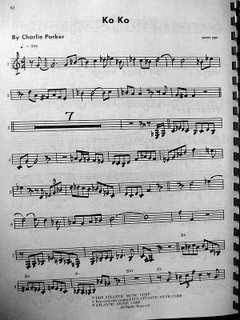Prime Number: Charlie Parker
Ko Ko is rightly regarded as one of the first definitive recordings of modern jazz. It ushered in a new era, one in which jazz became non-representational, something like an aural equivalent of Cubism. Today, 60+ years later it still sounds fresh, contemporary and jarring.
Bird makes no attempt to “represent” or “picture” Cherokee, the warhorse swing era tune whose chord changes underlie Ko Ko. The melody is ignored.

He just takes the chord changes as his source code and recompiles in real time, at high speed, using extended tones and harmonies. In the fragmentation and phrasing he employs, there is perhaps a hint of the multi-perspectivism of the Cubists, though this may be taking the comparison too far.
Musicians were overwhelmed when they heard Bird, and it is easy to see why. No one else had played with such a fierce improvisational logic at such a high velocity. Well, no one except his comrade in subversion, Dizzy Gillespie. Bird’s playing—urgent, fragmented and harsh on the surface—provoked the old timers, at least the more narrow-minded among them ("We don't flat our fifths, we drink them"--Eddie Condon); but it also spawned an entire generation of bop apostles who emulated everything about him, including, regrettably his self destructive habits. Bird’s preeminence among jazz musicians was unquestioned within a few years.
It is harder to understand how the open minded lay person might respond to this new music. You can’t hum it, dance to it or easily identify its source material. It is neither decorative nor easily consumable. You can marvel at the virtuosity of the performance. But this wears off pretty quickly. Ultimately, appreciation of it is much like appreciation of the cubist art mentioned earlier. In a sense, it demands active participation of the listener.
You really are challenged to match wits with Bird and cohere his improvisations. Through careful listening and study one can identify the logic, the private language that is in operation here. So, this is partially an intellectual exercise, one that you need to be willing to undertake. I don’t mean to make it sound like labor, but for the casual listener, the one that wants “easy listening” or wants pleasing background music, it is labor. Others though will be challenged and gratified by Bird’s music. They’ll get inside and understand the private language. And they’ll be able to enjoy countless hours of listening pleasure as they follow Bird in his endlessly creative use of his singular musical language, full of passion, logic, ecstasy and tragedy.
Play Ko Ko
This post originally accompanied a recording of Ko-Ko, but since I cannot seem to find a decent file hosting/streaming service, and the fascist thieves at Warner Music refuse to let me post it on a You Tube video, the audio will have to be imagined.
Bird makes no attempt to “represent” or “picture” Cherokee, the warhorse swing era tune whose chord changes underlie Ko Ko. The melody is ignored.

He just takes the chord changes as his source code and recompiles in real time, at high speed, using extended tones and harmonies. In the fragmentation and phrasing he employs, there is perhaps a hint of the multi-perspectivism of the Cubists, though this may be taking the comparison too far.
Musicians were overwhelmed when they heard Bird, and it is easy to see why. No one else had played with such a fierce improvisational logic at such a high velocity. Well, no one except his comrade in subversion, Dizzy Gillespie. Bird’s playing—urgent, fragmented and harsh on the surface—provoked the old timers, at least the more narrow-minded among them ("We don't flat our fifths, we drink them"--Eddie Condon); but it also spawned an entire generation of bop apostles who emulated everything about him, including, regrettably his self destructive habits. Bird’s preeminence among jazz musicians was unquestioned within a few years.
It is harder to understand how the open minded lay person might respond to this new music. You can’t hum it, dance to it or easily identify its source material. It is neither decorative nor easily consumable. You can marvel at the virtuosity of the performance. But this wears off pretty quickly. Ultimately, appreciation of it is much like appreciation of the cubist art mentioned earlier. In a sense, it demands active participation of the listener.

You really are challenged to match wits with Bird and cohere his improvisations. Through careful listening and study one can identify the logic, the private language that is in operation here. So, this is partially an intellectual exercise, one that you need to be willing to undertake. I don’t mean to make it sound like labor, but for the casual listener, the one that wants “easy listening” or wants pleasing background music, it is labor. Others though will be challenged and gratified by Bird’s music. They’ll get inside and understand the private language. And they’ll be able to enjoy countless hours of listening pleasure as they follow Bird in his endlessly creative use of his singular musical language, full of passion, logic, ecstasy and tragedy.
Play Ko Ko
This post originally accompanied a recording of Ko-Ko, but since I cannot seem to find a decent file hosting/streaming service, and the fascist thieves at Warner Music refuse to let me post it on a You Tube video, the audio will have to be imagined.
Labels: Bebop, Charlie Parker, Improvisation, Jazz, Yardbird

0 Comments:
Post a Comment
<< Home